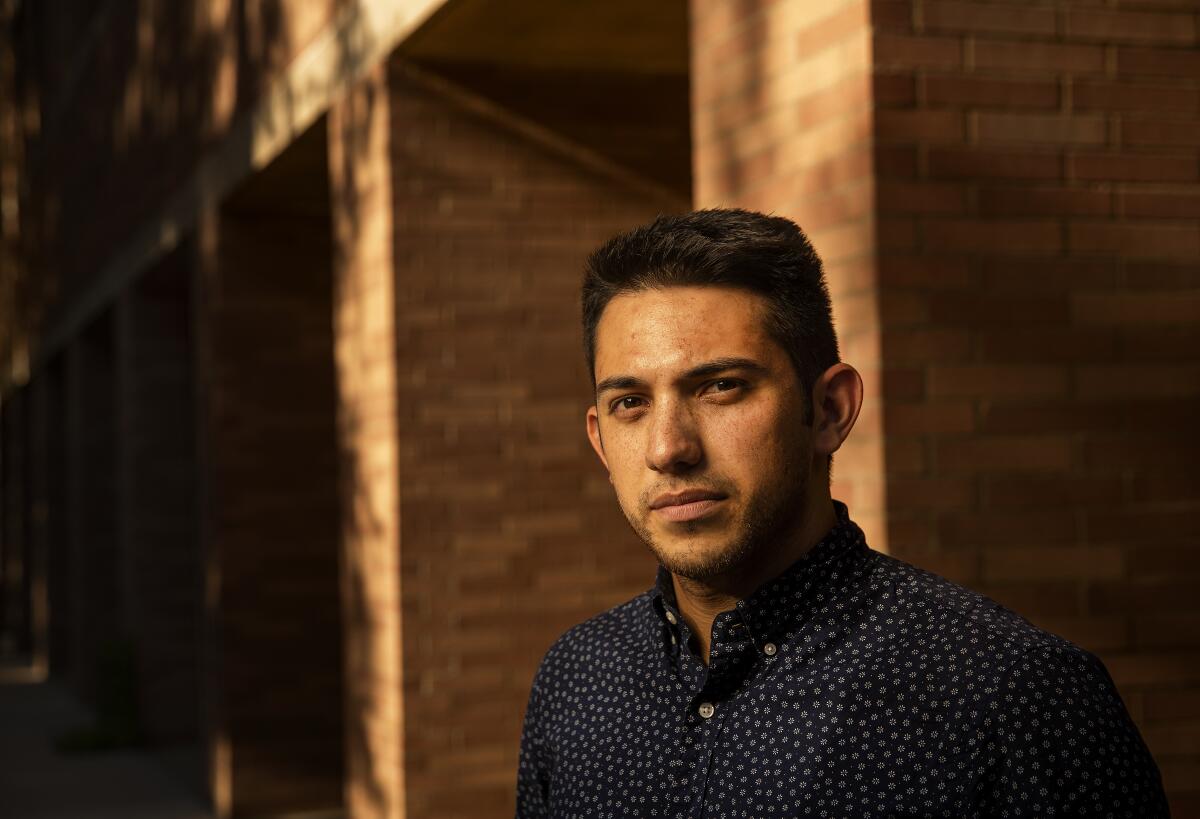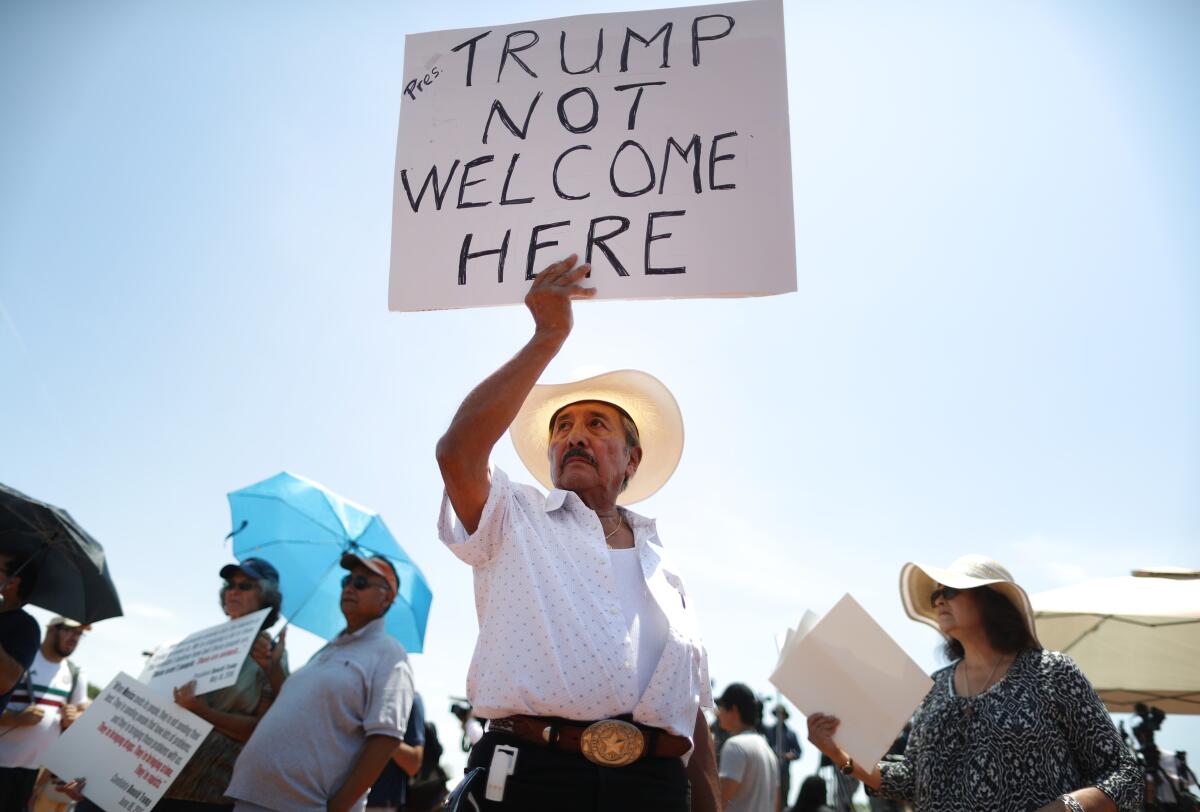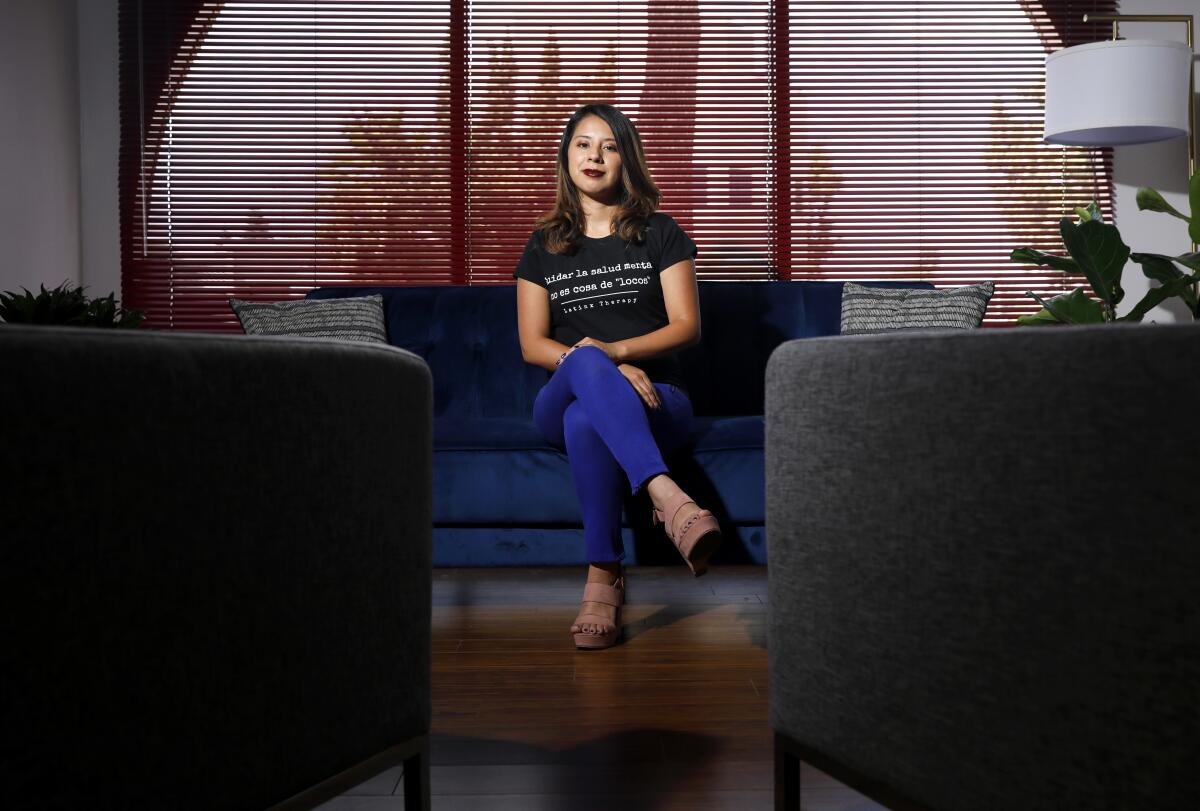Trump’s policies, as well as anti-immigrant violence, disturbed these Latinos. Now they’re taking action

- Share via
Adrian Rios was closing in on his dream job as a U.S. diplomat when the unexpected happened: Donald Trump entered the White House.
Throughout his campaign, Trump had labeled migrants from Mexico as rapists, criminals and drug traffickers. That rhetoric set the stage for Trump’s first months in office, as he took measures to crack down on both legal and illegal immigration, much of it flowing from Mexico and Central America.
“I couldn’t represent the country under his administration,” Rios said.
Instead, the 26-year-old Mexican American readjusted his plans: attend law school at UCLA, practice corporate law to pull his family out of poverty and provide free legal services to disadvantaged Latinos.
In the U.S., Latinos make up about 18% of the population but only 4% of its lawyers, according to the Hispanic National Bar Assn. Rios believes that not all Latino lawyers practice civil rights and immigration law full time and it’s one of the reasons why he felt it was important to incorporate pro bono work for Latinos.
“I felt I had to do everything because everything was at stake,” Rios said.
In the third year of the Trump presidency, many Latinos have found themselves in a state of reflection about their cultural identities, their place in U.S. society, and the need to act — whether via social media, political engagement or by shifting the trajectory of their personal and professional lives.

Last summer’s massacre in El Paso galvanized those feelings for many. The Aug. 3 rampage by a gunman at a Walmart, which left 22 people dead and about two dozen injured, was one of the deadliest hate crimes against Latinos in modern U.S. history. It underscored and deepened the fears, anxieties and stresses that Latinos have had to endure in America for decades.
The shooting also revived memories of racist crimes and violence perpetrated against Latinos dating back to the Mexican-American wars of the mid-1800s and even the colonial era: lynchings, murders, land thefts, labor abuses, housing discrimination and suppression of voting rights. In California, hate crimes against Jews and Latinos increased in 2018, a trend that a number of analysts blamed on anti-immigrant rhetoric and emboldened hate groups.
That moment of deep contemplation has prompted a response from the Latino population, including a number of prominent Latinos to speak out publicly. Shortly after the El Paso massacre, more than 200 actors, writers and artists of Latin American descent signed a letter of solidarity. Among the signatories were Eva Longoria, Sandra Cisneros and Diego Luna.
“We have been smeared by political rhetoric and murdered in violent hate crimes,” the letter read in part. “We will not be broken. We will not be silenced. We will continue to denounce any hateful and inhumane treatment of our community. We will demand dignity and justice.”
Through his speeches, tweets and campaign ads, Trump has not only demonized immigrants, but denigrated Latino cultural identity. While campaigning, for example, he took jabs at Republican rival Jeb Bush simply for speaking Spanish.
“Jeb Bush is crazy, who cares that he speaks Mexican, this is America, English!!” Trump wrote in a characteristic August 2015 tweet. Trump also claimed that Bush supported illegal immigration because his wife, Columba, is Mexican.
Trump’s lurid claims and perceptions, his critics say, paint a broader and more insidiously false picture, not just of immigrants from Mexico and other Latin American countries, but also of U.S.-born Latinos who now find themselves under scrutiny because of the color of their skin or for speaking Spanish. Although the majority of U.S. Latinos are now native-born, Trump’s rhetoric tends to conflate the native- and foreign-born.
For Laura Gomez, a law professor at UCLA, the scapegoating of immigrants specifically and Latinos in general feels familiar and cyclical.
In the mid-1990s, when she became a faculty advisor for La Raza Law Students Assn., anti-illegal immigration efforts in California were being led by Republicans and backed by then-Gov. Pete Wilson.
In 1994, the Republican governor spearheaded the passage of Proposition 187, a ballot initiative that set up a citizenship screening system and barred immigrants who were in the state illegally from receiving an array of public benefits and services.
Gomez said that the battle over Proposition 187 helped shape a new generation of young Latinos politically, with repercussions that have continued into the present — notably, California’s shift from a purple state three decades ago to a deep-blue one now.
“There was a lot of energy in the law students,” Gomez said. “Some of the students that were protesting then are leaders today.”
Clashes over immigration policy under Trump may be spurring a similar reaction. Across the country, law schools are seeing an upward trend in classes on immigration law and slight increases in the number of minority law students, including Latinos, according to data from the American Bar Assn. In 2017, there were 13,260 minority students enrolled in law school, about 5,475 of whom were Latinos. The figure was an increase from the previous year when there were 11,880 minority students enrolled.
Holly Cooper, a law professor at UC Irvine, said she has seen an increase of Latino students participating at the immigration rights clinic, which allows students to represent people on immigration matters under faculty supervision.

A number of young Latinos lately have been drawn to other careers aimed at helping immigrants. When Adriana Alejandra, who is Mexican American, began her practice as a trauma and anxiety therapist in 2017, she was overwhelmed with the number of clients who wanted someone who spoke Spanish and shared their cultural background.
After obtaining her masters in clinical psychology from Pepperdine University, she realized that there was a considerable need for Latinx therapists. In April 2018, she launched the Latinx Therapy podcast and immediately got national attention. The show was featured on Apple’s iTunes.
The same year, she hired a web developer and launched a Latinx Therapy directory that listed Latinx and bilingual therapists and other mental health experts, such as an immigration evaluation therapist, behavioral technicians and psychologists. Additionally, the directory serves as a place where Latinos could find other services related to mental health, including bilingual self-help books.
The idea for it came from her own struggle in finding referrals to experts who were bilingual or Latinx. The directory now has more than 1,500 members. Alejandra said that her role seems especially important at a time when hostility toward Latinos is rising.
“On a personal level, it’s frightening and disheartening,” she said. “On a professional level, it’s anxiety-provoking and aggravating because the policies are focused on our people. We’re working so hard to end these cycles of generational trauma, but these laws aren’t helping.”
Long before Trump entered the world of politics, Daniel Buezo, 31, was looking to address the lack of Latino presentation among fashion designers. He said that not seeing enough Latinos in pop culture left him at a loss for how to identify himself as an American.
Buezo said that after Trump took office, he felt reaffirmed about the purpose behind the L.A.-based streetwear line Kids of Immigrants, which he launched in 2016 with his business partner, Weleh Dennis, whose parents are from Liberia. The brand, worn by celebrities such as Kehlani and Big Sean, includes cotton T-shirts emblazoned with the word “immigrants” and corduroy hats that implore people to “support your friends.”
“This is a calling for us to unite,” Buezo said.
The son of Honduran immigrants, Buezo grew up in New York City. He said he was targeted repeatedly for stops by police during the stop-and-frisk era. His father, a construction worker, and mother, a housekeeper had wanted him to become a lawyer or a doctor. He said they didn’t understand his desire to go into fashion. But he tells them that everything he is doing is because of them.
“My mother crossed that border, my family crossed the border illegally,” he said. “The people who are fleeing their country, they’re not leaving this beautiful home. They’re leaving a place that either you die or you leave. It’s not a choice.”
Buezo and Dennis have donated money to nonprofits, including Border Angels and Inner City Arts. Earlier this year, Buezo visited Tijuana after a caravan of Central American migrants had arrived.
“We as Latino people need to be the leaders that we’re waiting for,” he said.
The step-up in anti-immigrant sentiments, and violence against Latinos, is happening at a time when representation of Latinos in TV and movies, the nation’s largest ethnic minority group, is abysmal. A new study from the USC Annenberg Inclusion Initiative found that among 1,200 popular films released between 2007 and 2018 — a sample of the top 100 films per year — just 4.5% of more than 47,000 speaking or named roles went to Latinx actors. Only 3% were lead or co-leads.
And many of those roles fulfilled stereotypical images of Latinos as migrants, maids and gardeners. Far rarer were images of Latinos with multigenerational U.S. roots, or of the middle-class professionals among the nation’s 60 million people of Latino heritage.
This underrepresentation, and misrepresentation, of Latinos in popular culture has spurred Latinos such as Wilmer Valderrama to action.
“If you’re part of those 60 million, you have a major responsibility to make sure that someone doesn’t erase your heritage, the struggle and sacrifice that your great-grandparents or grandparents or parents made,” said Valderrama, an actor known for his roles as Fez in “That ’70s Show” and Nick Torres on NCIS, who also was among the Latino artists who signed the letter of solidarity after the El Paso shooting.
Valderrama, whose Colombian Venezuelan family immigrated to the United States when he was a teenager, advocates for immigrants on issues such as workers’ rights, immigration reform and voter turnout. He said that the El Paso shooting and Trumpian rhetoric against Latinos suggest that the country is regressing.
“Millions of immigrants through generations have come to this land and, brick by brick, made it a country. Now there’s an attack on the very DNA of this country,” he said. “I think a lot of people forgot how they got here.”
More to Read
Sign up for Essential California
The most important California stories and recommendations in your inbox every morning.
You may occasionally receive promotional content from the Los Angeles Times.












